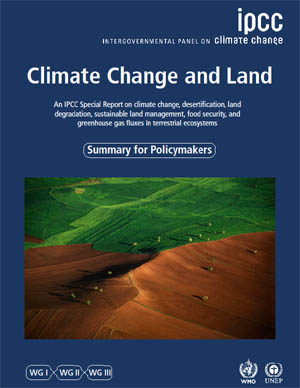Land is a critical resource
12-08-2019Dutch farmers share through Agriterra their expertise on sustainable intensification with farmers in emerging economies to increase global food production and adapt to climate change. This is a global challenge which is also being addressed in the IPPC report (The Intergovernmental Panel on Climate Change) that was published last week:
https://www.ipcc.ch/2019/08/08/land-is-a-critical-resource_srccl/
Agriterra aims to boost intensification of agriculture, spur the agro-industrialisation and take care of resources and reforestation. Smart use of land and stopping the drastic slash and burn tactics are critical success factors for sustainable, productive agriculture and forest preservation and restoration.
The IPPC report states: “There is real potential here through more sustainable land use, reducing over-consumption and waste of food, eliminating the clearing and burning of forests, preventing over-harvesting of fuelwood, and reducing greenhouse gas emissions, thus helping to address land related climate change issues.”
Summary and conclusions
Land use
Land provides the principal basis for human livelihoods and well-being including the supply of food, freshwater and multiple other ecosystem services, as well as biodiversity. Better land management can contribute to tackling climate change but is not the only solution. Reducing greenhouse gas emissions from all sectors is essential if global warming is to be kept to well below 2ºC, if not 1.5ºC.
Land must remain productive to maintain food security as the population increases and the negative impacts of climate change on vegetation increase. This means there are limits to the contribution of land to addressing climate change, for instance through the cultivation of energy crops and afforestation. It also takes time for trees and soils to store carbon effectively. Bioenergy needs to be carefully managed to avoid risks to food security, biodiversity and land degradation. Desirable outcomes will depend on locally appropriate policies and governance systems.
The world is best placed to tackle climate change when there is an overall focus on sustainability. “Agriculture, forestry and other types of land use account for 23% of human greenhouse gas emissions. At the same time natural land processes absorb carbon dioxide equivalent to almost a third of carbon dioxide emissions from fossil fuels and industry.” The report shows how managing land resources sustainably can help address climate change. “Land already in use could feed the world in a changing climate and provide biomass for renewable energy, but early, far-reaching action across several areas is required”. “Also, for the conservation and restoration of ecosystems and biodiversity.”
Food security
Coordinated action to address climate change can simultaneously improve land, food security and nutrition, and help to end hunger. “Food security will be increasingly affected by future climate change through yield declines – especially in the tropics – increased prices, reduced nutrient quality, and supply chain disruptions.” “We will see different effects in different countries, but there will be more drastic impacts on low-income countries in Africa, Asia, Latin America and the Caribbean.”
The report records that about one third of food produced is lost or wasted. Causes of food loss and waste differ substantially between developed and developing countries, as well as between regions. Reducing this loss and waste would reduce greenhouse gas emissions and improve food security.
“Some dietary choices require more land and water and cause more emissions of heat-trapping gases than others.”
“Balanced diets featuring plant-based foods, such as coarse grains, legumes, fruits and vegetables, and animal-sourced food produced sustainably in low greenhouse gas emission systems, present major opportunities for adaptation to and limiting climate change.”
The report finds that there are ways to manage risks and reduce vulnerabilities in land and the food system. Risk management can enhance communities’ resilience to extreme events, which has an impact on food systems. This can be the result of dietary changes or ensuring a variety of crops to prevent further land degradation and increase resilience to extreme or varying weather.
Reducing inequalities, improving incomes, and ensuring equitable access to food so that some regions (where land cannot provide adequate food) are not disadvantaged, are other ways to adapt to the negative effects of climate change. There are also methods to manage and share risks, some of which are already available, such as early warning systems.
An overall focus on sustainability coupled with early action offers the best chances to tackle climate change. This would entail low population growth and reduced inequalities, improved nutrition and lower food waste.
This could enable a more resilient food system and make more land available for bioenergy, while still protecting forests and natural ecosystems. However, without early action in these areas, more land would be required for bioenergy, leading to challenging decisions about future land-use and food security. “Policies that support sustainable land management, ensure the supply of food for vulnerable populations, and keep carbon in the ground while reducing greenhouse gas emissions are important.”

